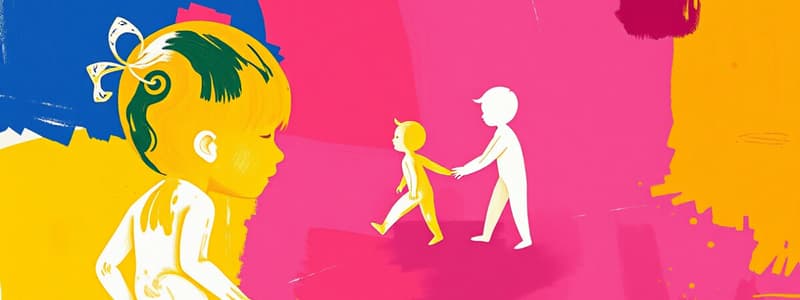Podcast
Questions and Answers
What is the typical heart rate for a one-year-old child?
What is the typical heart rate for a one-year-old child?
- 80–100 beats per minute
- 120 beats per minute (correct)
- 120–160 beats per minute
- 100–120 beats per minute
Which developmental milestone occurs by the age of six months?
Which developmental milestone occurs by the age of six months?
- Say complex sentences
- Walk independently
- Recognize his own reflection
- Respond to simple requests (correct)
At what age should an infant be able to track objects and focus on objects 8–12 inches away?
At what age should an infant be able to track objects and focus on objects 8–12 inches away?
- By one month
- By two months (correct)
- By four months
- By six months
What is the average blood pressure range for toddlers aged 12 to 36 months?
What is the average blood pressure range for toddlers aged 12 to 36 months?
Which of the following is not a typical physiological change observed in infancy?
Which of the following is not a typical physiological change observed in infancy?
What is the normal respiratory rate range for preschool-age children?
What is the normal respiratory rate range for preschool-age children?
At what age should a child be able to finger feed himself?
At what age should a child be able to finger feed himself?
Which vital sign remains consistent from birth to one year of age?
Which vital sign remains consistent from birth to one year of age?
What is a significant change noted in early adulthood regarding physiological developments?
What is a significant change noted in early adulthood regarding physiological developments?
At what age range is the heart rate typically between 70-110 beats per minute for school-age children?
At what age range is the heart rate typically between 70-110 beats per minute for school-age children?
Which psychosocial change is prominent during adolescence?
Which psychosocial change is prominent during adolescence?
By what age should a child be able to climb up and down furniture or stairs confidently?
By what age should a child be able to climb up and down furniture or stairs confidently?
What vital sign changes are expected for adolescents aged 13 to 18 years?
What vital sign changes are expected for adolescents aged 13 to 18 years?
Which physiological change can occur during middle adulthood?
Which physiological change can occur during middle adulthood?
What is the typical systolic blood pressure range for school-age children?
What is the typical systolic blood pressure range for school-age children?
What is a typical play behavior exhibited by toddlers?
What is a typical play behavior exhibited by toddlers?
Flashcards are hidden until you start studying
Study Notes
Infancy
- Vital signs for newborns: Respiratory Rate (RR) 20-30 breaths/min, Heart Rate (HR) 100-160 beats/min, Blood Pressure (BP) 70 mmHg.
- At one year: RR remains at 20-30 breaths/min, HR approximately 120 beats/min, BP around 90 mmHg.
- By two months, infants can track objects, recognize familiar faces, and display primary emotions.
- At six months, infants can sit without assistance, respond to their name, and say "mama" or "dada."
- By one year, they are capable of finger-feeding and grasping toys, and they can follow moving objects.
Psychosocial Changes in Infancy
- Infants experience separation anxiety, often expressing distress through crying.
- Development of relationships begins, with significant attachment to caregivers.
Toddlers and Preschool-Age Children
- Vital signs for toddlers (12-36 months): HR 80-120 beats/min, RR 20-30 breaths/min, BP 70-100 mmHg, temperature 98.6–99.6°F.
- For preschool-aged children (3-5 years): HR 80-120 beats/min, same RR, BP 80-110 mmHg.
- By age three, children develop abilities like hopping, dressing independently, and using utensils properly.
- By age five, they can count ten or more objects and engage in more complex physical play.
Psychosocial Changes in Toddlers and Preschool-Age Children
- Language skills improve, leading to better communication.
- Play becomes more structured and imaginative.
- Children at this age are characterized by honesty; they do not lie.
School-Age Children
- Vital signs for children aged 6-12: HR 70-110 beats/min, RR 20-30 breaths/min, BP 80-120 mmHg, with temperatures around 98.6°F.
- Physiological changes include loss of primary teeth and the development of reading/writing skills, as well as occurrences of nocturnal enuresis (bedwetting).
- Psychosocially, children develop relationships, self-concept, and begin to recognize emergency workers as helpers.
Adolescence
- Vital signs for 13-18 years: HR 55-105 beats/min, RR 12-20 breaths/min, BP 100-120 mmHg, temperature at 98.6°F.
- Significant physiological changes include growth spurts and puberty.
- Psychosocial challenges involve feelings of invulnerability, maintaining confidentiality, exploring identity, and managing body image issues.
Early Adulthood
- Vital signs for ages 20-40: HR 70 beats/min, RR 16-20 breaths/min, BP 120/80 mmHg, and average temperature 98.6°F.
- This stage marks the physical peak; however, conditioning begins to decline.
- Psychologically, individuals seek independence, face responsibilities, and manage job stress.
Middle Adulthood
- Vital signs for individuals aged 41-60: HR 70 beats/min, RR 16-20 breaths/min, BP consistent at 120/80 mmHg, and temperature around 98.6°F.
- Physiological changes may include chronic health conditions, decreased metabolism, and hormonal changes, particularly in women during menopause.
Studying That Suits You
Use AI to generate personalized quizzes and flashcards to suit your learning preferences.




